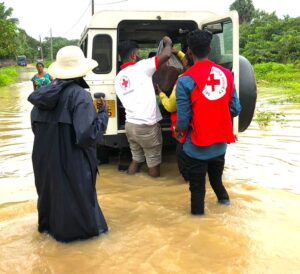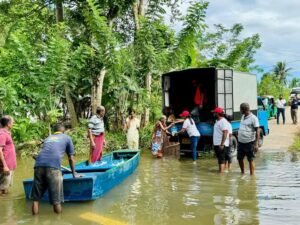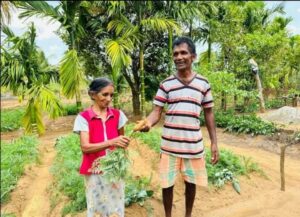Disaster Management & Climate Crisis
At Sri Lanka Red Cross Society (SLRCS), disaster management isn’t just a programme; it’s a commitment to bolstering community resilience and ensuring swift, effective responses to crises, both natural and man-made. Our mission is clear: to fortify communities against disasters while maintaining organizational readiness for rapid, lifesaving interventions.
SLRCS’s Disaster Management (DM) program is structured around two core areas: institutional readiness and community empowerment for disaster risk reduction. Within these areas, we implement five crucial components:
- Institutional Preparedness: Equipping ourselves to respond swiftly and effectively.
- Community-Based Risk Management: Empowering communities to mitigate risks.
- Climate Change Adaptation: Addressing evolving environmental challenges.
- Livelihood and Development: Supporting sustainable recovery and growth.
- Skilled Human Resources: Investing in training for effective response.
Drawing from decades of experience in disaster relief and response, SLRCS stands as a pillar of support in times of crisis. We’ve honed our capacity to not only provide immediate relief but also to champion proactive disaster risk reduction efforts. From implementing school disaster management programs to strengthening early warning systems, our initiatives prioritize community protection and resilience.
SLRCS actively collaborates with stakeholders, including the government’s Disaster Management Committee, ensuring alignment with national disaster management strategies. As a member of the National Disaster Management Committee, our role is clearly defined within Sri Lanka’s disaster risk management roadmap. Moreover, we engage in regional and global initiatives to enhance our collective response capabilities.
In a world facing increasing climate-related challenges, SLRCS remains proactive in preparing for future crises. We’ve developed comprehensive disaster management policies, established national and district-level response teams, and implemented rigorous training programs. Our goal is not just to respond to disasters but to anticipate and mitigate their impact through proactive measures.
At SLRCS, every disaster management effort is guided by our fundamental principles of humanity, impartiality, neutrality, independence, voluntary service, unity, and universality. We strive to ensure that our programs are inclusive, need-based, and respectful of the dignity of those affected. Together, we continue to build a more resilient Sri Lanka, one community at a time.
How we address the Climate Crisis in Sri Lanka?
Climate Change Programmes of SLRCS is dedicated to bolstering the resilience of vulnerable communities in Sri Lanka. Through a blend of short-term and long-term initiatives, we aim to mitigate the adverse effects of climate change and build sustainable solutions for the future.
As the impact of climate change reverberates across the globe, it is the developing nations that bear the brunt of its economic and social repercussions. Recognizing this urgent need for action, the Sri Lanka Red Cross Society (SLRCS) is in the process of establishing its team to work in a better way in response to the climate crisis. Our focus extends from policy formulation to grassroots implementation, addressing the challenges posed by climate change as a slow-onset disaster.
Objectives:
- Community Awareness: Educating communities on the impacts of climate change on their lives, livelihoods, and ecosystems, fostering a deeper understanding and proactive response.
- Capacity Building: Strengthening the capacity of SLRCS staff, volunteers, and governing bodies through targeted trainings and workshops, equipping them to tackle climate-related challenges effectively.
- Action Initiatives: Taking proactive measures in climate change adaptation, disaster risk reduction, community resilience, and promoting sustainable production and consumption practices.
- Corporate Engagement: Building partnerships with the corporate and industrial sectors to integrate climate change adaptation and disaster risk reduction activities into their Corporate Social Responsibility (CSR) projects and campaigns.
- Advocacy: Advocating for climate change adaptation and disaster risk reduction at local, national, and international levels, driving policy changes and promoting proactive measures.
Our efforts are bolstered by collaboration with key stakeholders, including:
- Climate Change Secretariat of the Ministry of Environment
- Ministry of Environment
- Ministry of Irrigation
- United Nations Development Project
- Global Green Growth Institute
- International Federation of Red Cross and Red Crescent Societies (IFRC) through the Emperor Shoken Fund
At SLRCS, we are committed to empowering communities, enhancing resilience, and fostering sustainable development in the face of climate change. Together, we can create a brighter, more resilient future for all!


